
The Best TV Shows of 2020
Has there ever been a better year to binge? Generally, I mean, but certainly when it comes to TV shows. Fortunately, there were some real gems to be found in the television offerings served up in this turd of a year. Some leaned sweet, others sharp and many gave us the almost pornographic pleasures of seeing people eat in restaurants, go to parties, shout in each other’s faces in crowded bars, or just breathe the same air for a while. The stories in all of them showed us where we’ve been and where we’re going. We’ll get there again. In the meantime, grab the remote and your favorite snacks, settle once more into the sofa, and cue up the best TV of 2020. We’ll get there.
– Sara Clemens, Curator

Ted Lasso
Ted Lasso begins like an English football remake of Major League: A hard-nosed female franchise owner looking to sink the ship for selfish reasons builds what should be a surefire loser. In this case, Rebecca Welton (Hannah Waddingham) hires the American college football coaching duo of Lasso (Jason Sudeikis) and his assistant, Coach Beard (Brendan Hunt). They’re fresh from leading Wichita State to a Division II title and know precisely nothing about the beautiful game.
Like in Major League, the plan hits a snag. Hiring Lasso and Beard backfires when it turns out that the goofy and ostensibly unsophisticated Lasso has a lot more to offer than meets the eye. That plot twist, if it’s even enough of one to be called that, is wholly predictable. But it’s also the point in which the show begins to diverge from Major League. With all due respect to Wild Thing, Willie Mays Hayes & Co., as Lasso’s unique brand of genius begins to reveal itself, this Apple TV+ series becomes something more than a sports comedy. Lasso, we come to understand, is a true leader, one who, despite his obvious failings, manages to bring out the best in everyone around him, from the bullied clubhouse attendant all the way up to the shattered woman sitting in the AFC Richmond owner’s box.
The show is funny. It’s charming. It’s full of heart. But more than anything else, it boasts one of the most likable characters we’re apt to come across. During this mostly awful year, at a time and in a place starving for genuine leadership, he’s a reminder of what that looks like. Ted Lasso is honest, caring, humble and patient. His greatest flaw, sadly, is that he’s fictional.
– Matt Marrone
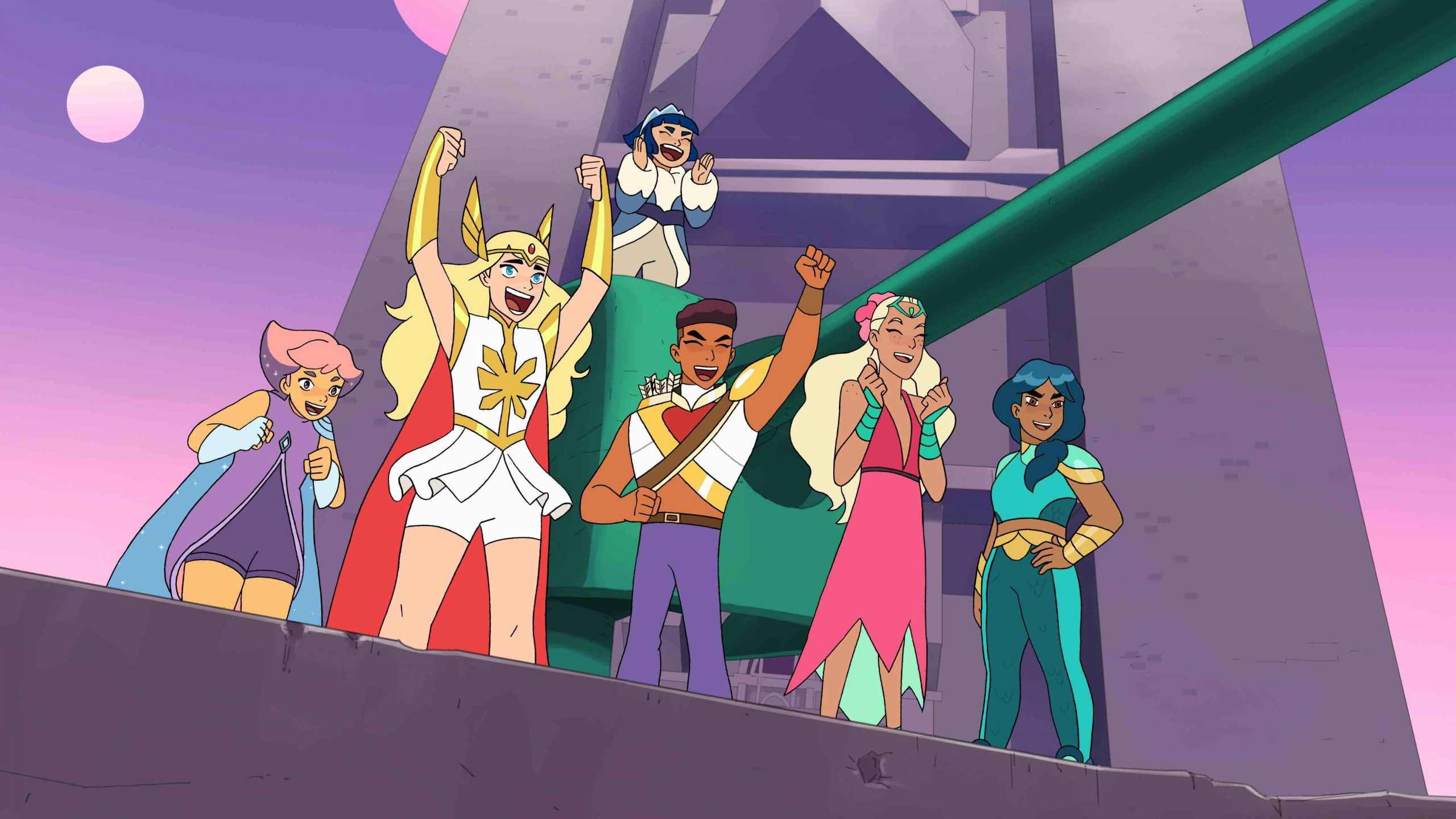
She-Ra and the Princesses of Power
The conclusion of Netflix’s hit animated revival is the most cogent expression of the series’ queer themes and imagery. Season 5 begins in a new world, an entire universe, actually, as Etherea has been transported back to its dimension. As the stars come out, new colors fill the sky. There are new planets and civilizations and possibilities, just as Adora and Catra’s slow but faithful reorientation to each other brings up new possibilities for their relationship to each other as well. But queerness is not itself an otherworldly experience. Indigenous inhabitants of Etheria like Bow and Spinnerella have flouted rigid gender expression since season 1. Adora, however, is a transplant from another world, and Catra has given herself to the indoctrination of the Horde. Now refigured as a colonizing force from a galactic empire at the planet’s doorstep, the curtains are pulled back. Hordak Prime is the patriarchy, Catra has internalized homophobia and a cultish empire lifted out of our own capitalist hell-scape wants to occupy Etheria for its nature magic. So, while its metaphors are pretty explicit, they add up to a weighty fight we are familiar with the consequences of.
Trauma and abuse figure heavily in this representation of queerness, which is why I think so many 20- and 30-year old’s have latched on to what is a conventional Scholastic 5-volume YA series. It’s not good because it’s sparkly and has an unequivocally “happy ending” that is so entrenched in heteronormativity it really shouldn’t be called subversive in 2020, and it’s not good because it eschews all childlike frivolity to discuss its “mature,” “adult” themes. With its unabashed rainbow palette, She-Ra takes both extremes and slams them together in a saccharine fusion of love and love. It proposes that we will come together in the embrace of our ends, that this is necessary. If more people got that from our middle school book fairs, we wouldn’t be in need of such stories today.
– Autumn Wright

The Untamed
I don’t enjoy a lot of television; even strong concepts have a tendency to be stretched incredibly thin across a single season, and across multiple years it can get even worse. Think about the number of times someone has tried to get you into a show but had to lead with “so you have to get through [x number] of episodes and then it gets good.” You have to worry about whether there was a change in showrunners, or performers. Whether they actually knew the entire arc of the show before they began. Enter, The Untamed, which is a 50-episode, well-plotted epic of love and death, war and greed. There’s consistency and intentionality there, to a thing that was made at once and that was never going to have a second season. A completeness.
The inciting action of The Untamed is the death of its main character. The rest of the series is a build off of that moment – the actions that precede and follow it. You can do that kind of thing when your lead is a necromancer. While there, the show delves into themes of family, loss, enduring love and the sacrifices people make in the name of war.
– Amanda Hudgins
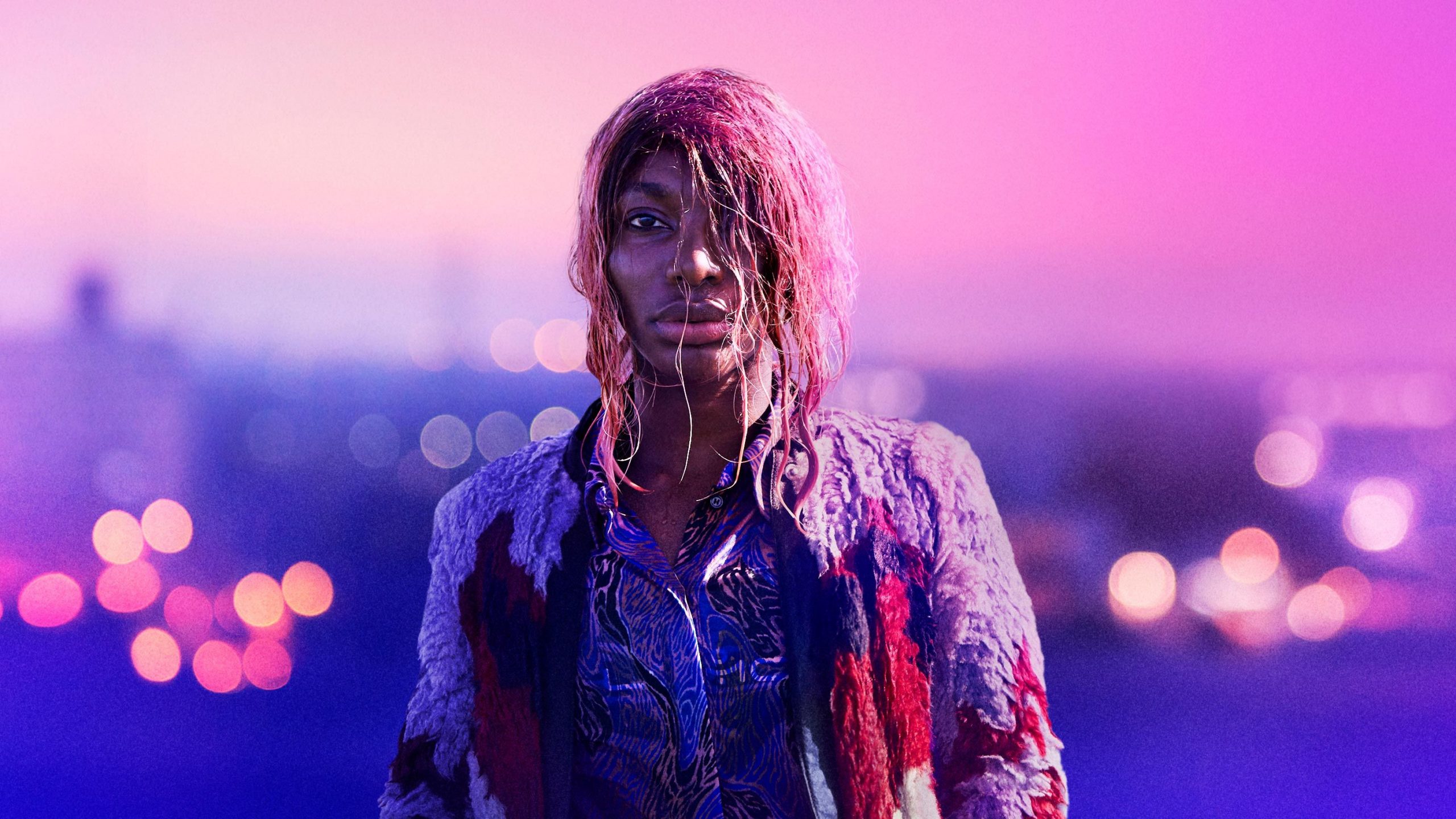
I May Destroy You
Michaela Coel’s I May Destroy You is an unsparing psychological study, equal parts funny and agonizing. It is so many things at once – an exploration of sexual trauma that embraces complexity and contradiction, a story about how social media warps perspective and feeds narcissism, and a young writer’s work of semi-autobiography that suggests semi-autobiography is an inescapable Faustian bargain for the young writer. All of these threads, large and small, give life to the constellation of characters in orbit around the capricious and shellshocked Arabella. TV writers so often get bogged down in the sheer amount of space available to them, but Coel crafts 12 electric, nimble episodes that make more of their half-hour runtimes than anything else in recent memory.
– Astrid Budgor

Heaven Official’s Blessing
The past few years have been great for fans of danmei, following the donghua adaptations of works like Grandmaster of Demonic Cultivation and Scum Villain Self-Saving System. This year another major work, Heaven Official’s Blessing (sometimes called TGCF) started airing its own animated adaptation, and thus far I am completely in love. TGCF centers around the characters of Xie Lian, an ancient martial scrap god who is probably best described as “having Forest Gump’ed” his way through most of the regions and events our characters see or discuss in the present, and San Lang, a young man who is absolutely not suspiciously powerful/knowledgeable/resilient in any way, nu-uh, no sir. You get to watch the pair of them wander ancient fantasy China and deal with whatever strange mishaps come their way, but more importantly fall in love against a background of specters of war, kidnapping, sentient swords, betrayal, acts of love via carpentry, giant robots and accidental child acquisition/loss. The series has followed the book very closely thus far, so if faithful adaptations are your thing jump in. The animation is beautifully rendered, the music and opening/closing credit scenes are worth watching for them alone, the humor and pacing is spot-on, and (providing Funimation cooperates) you’ll get a new episode each week. Definitely give this one a shot.
– Gingy Gibson
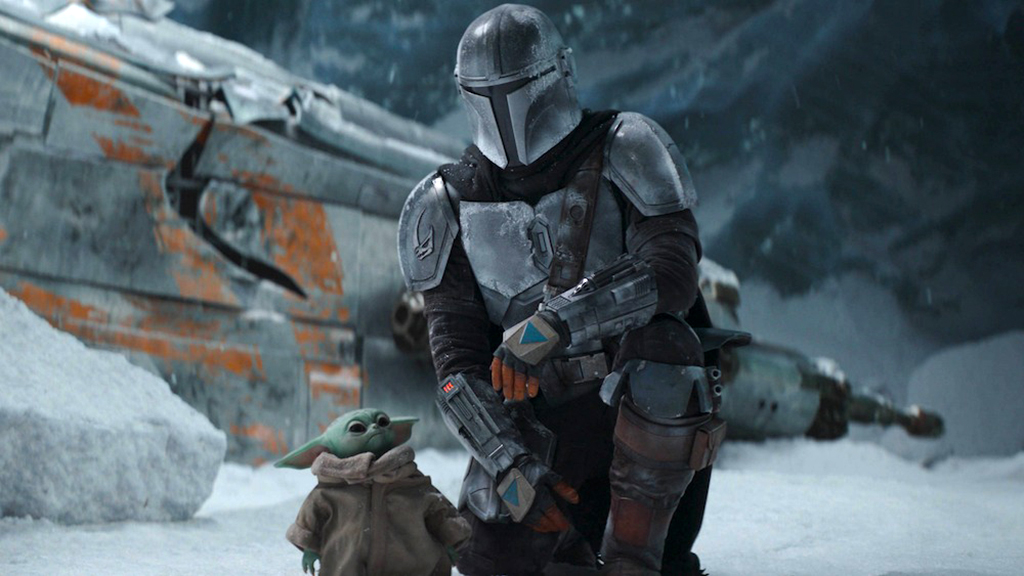
The Mandalorian
Something about the past year has had us yearning for comfort. This is a dangerous state – what we want is often at odds with what we need. Consumers were caught sweaty for more Star Wars, myself included. And while The Last Jedi was a highlight of the series for me (though not without its faults), The Rise of Skywalker essentially severed my enjoyment of the franchise at large. Let the Force lie, dead and bloated, buried among the stars, with this over-managed monstrosity of multi-tiered marketing.
Then Baby Yoda hit the ground with his Mogwai eyes, surrounded by a virtual reality volume that finally dialed into the Lone Wolf and Cub vibes first sampled in A New Hope. For two seasons I’ve fawned, yelped, gasped and cheered from one side quest to the next. With a main character that shows his face in all of three scenes but still acts up a storm through the body, notable guest stars that don’t overwhelm the frame and that sweet spot of Star Wars score and spectacle that just licks the line between sweet and cloying – The Mandalorian just fuckin’ gets it man. My dad is gone but I feel like I’m watching this show with him, like we would marathon the originals on summer weekends and winter breaks, like how we caught The Phantom Menace over high school graduation and enjoyed the ride before over-analysis spoiled the broth. The way these tales were meant to be savored.
– Levi Rubeck
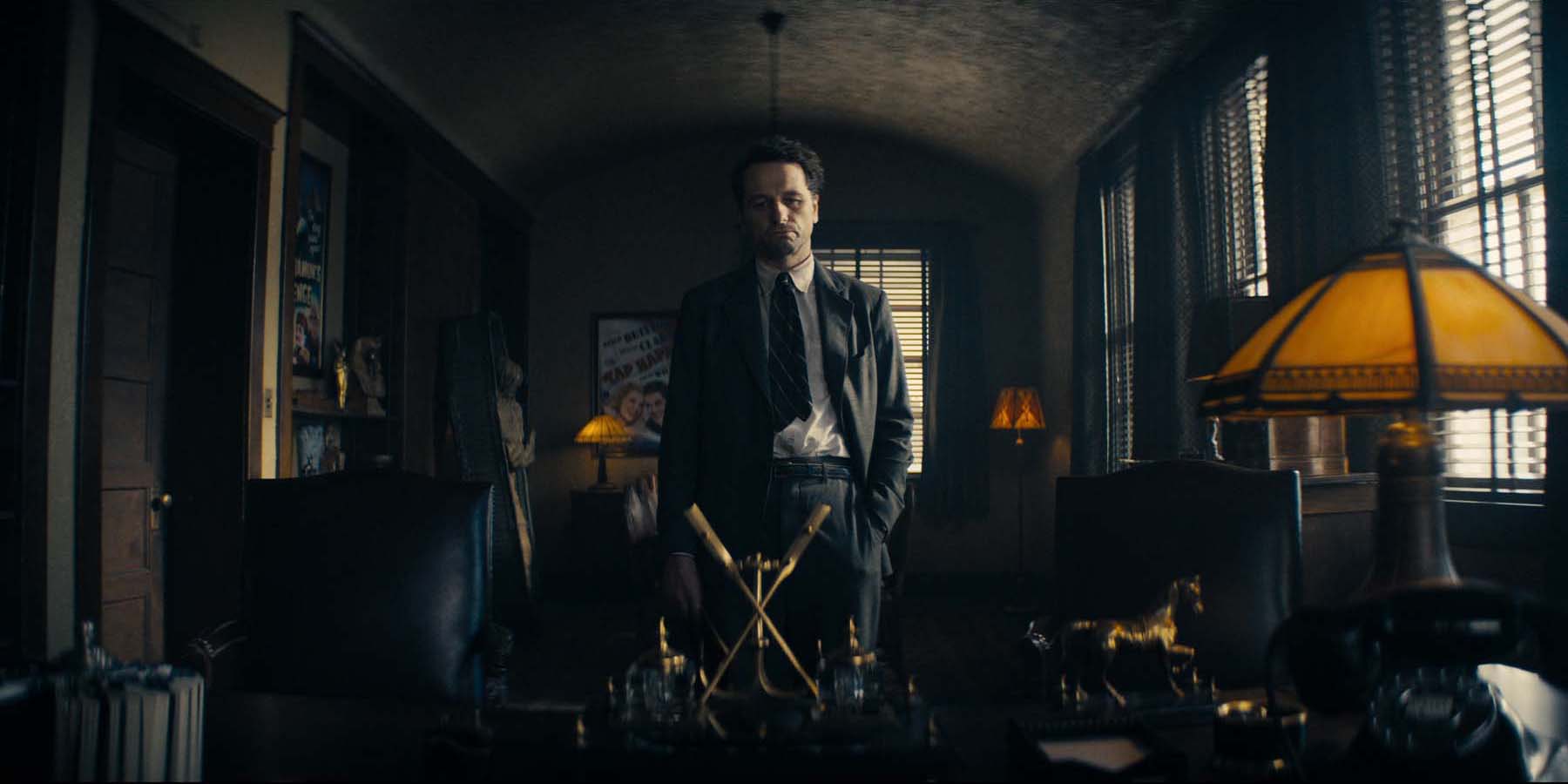
Perry Mason
I don’t really like lawyer shows. I have no particular feelings about Perry Mason as an established character of American popular culture. I mostly watched it because I got used to watching HBO on Sunday nights thanks to The Outsider and I can always watch another stylish mystery show.
That said, I didn’t have any preconceived notions about Mason that this origin story could shatter (are there angry Perry Mason fans on the internet, demanding the destruction of HBO because of the amount of penises displayed in the show? Probably.). I like Matthew Rhys’ hangdog look and how he imbues Mason with a deep sense of barely maintained functionality. I love Juliet Rylance’s Della Street as the true source of competence behind both Mason and his mentor, John Lithgow’s elder lawyer E.B. Jonathan.
Mostly, I enjoyed the world. The plot of the show is labyrinthine and I am honestly not entirely sure, Big Sleep-style, how it all comes together in the end. Which is fine, the details don’t matter, its the feelings they give you. I found mine were surprisingly strong. Perry Mason paints a vivid, dizzying picture of an unjust world, one so fortified it seems unalterable. That world nearly grinds Perry and his client into nothingness, but just when he should break, he gets mad instead. He stands up and spits in everyone’s eye – it isn’t about winning the case, not really. It is about shouting the truth so someone hears it, even if the outcome is still unjust. It isn’t, of course. We know the beats of the lawyer show too well to be surprised by that. But Perry’s victory doesn’t change the world or shatter the edifice of injustice. All that’s still there and the hard-fought victory didn’t matter, not really. In the end, Perry Mason is about all the work still left to do. Better roll up your sleeves.
– Stu Horvath

The Outsider
Adapting Stephen King books for movies or TV seems to be a bit of a hit or miss proposition. For every Shawshank Redemption and The Shining, there’s a Dreamcatcher and Dark Tower. But, given that King doesn’t seem close to retiring anytime soon, new adaptations keep coming, and this year HBO pulled a winner out of the King mystery hat with The Outsider. From the opening beats about a murdered child and an impossible suspect, The Outsider’s seemingly straightforward storyline turns around and becomes deeply unsettling. Ben Mendelsohn pulls out a terrific role with the lightly lisping Detective Anderson and Cynthia Erivo’s Holly Gibney was instantly one of my favorite characters from the last couple years. Following a standard King tradition, The Outsider struggles to stick the landing a little bit, but the performances from the cast pull it through for one of the best horror shows in recent memory.
– Noah Springer
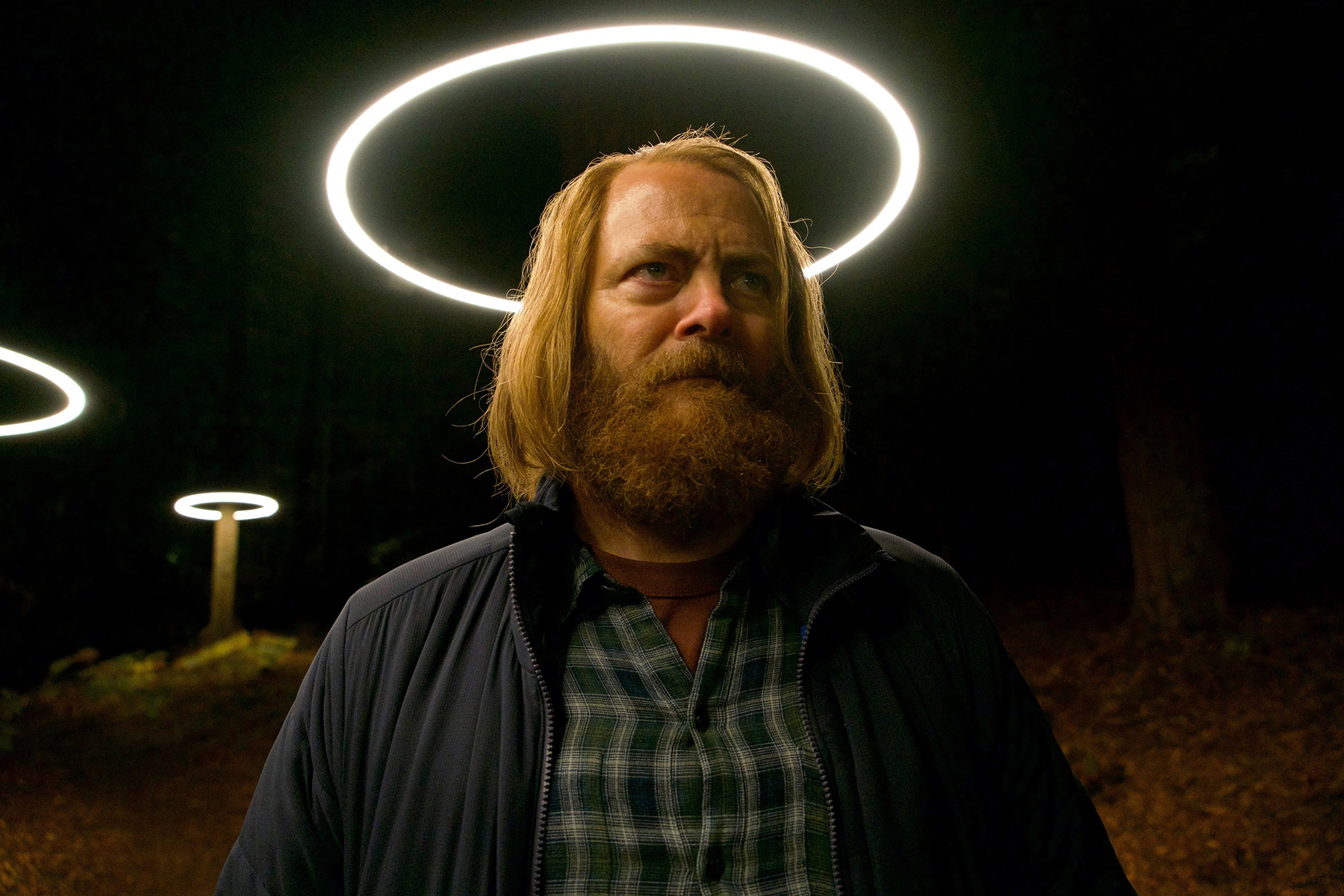
Devs
Devs is a show of questions. A wound ball of multiple strings, some intersecting each other. Like its main character, Sonoya Mizuno’s Lily, pulling at one reveals another puzzle, a recursive trap of logic and determinism. All with really good lighting.
At its most basic, Devs is a techno-thriller. One day, a man walks into the most secret, most high-tech part of a secretive high-tech company. He never returns home. What happened to him? Why did this happen to him?
Well, this is where Devs becomes Devs. It is a show about free will, obsession, responsibility and determinism. Do we have free will or are our lives the sums of other decisions and, if our lives are that sum, can we use technology to see every moment in all of history, past, present and future? Further, should we?
Like other Alex Garland works, the actual explorations of the philosophy and metaphysics are all a bit daft and sometimes silly. However, Devs overcomes this by featuring characters genuinely grappling with a sense of meaning coming out of their work and their discoveries. They struggle with past choices putting them on a path to destruction. Here, the entire main cast authentically feels like they have defined motivations and come to realizations about the questions they’re asking.
What puts Devs among the best of 2020 isn’t that it is a show about questions. It’s among the best because its authentically about how interesting characters handle the answers to questions.
– David Shimomura
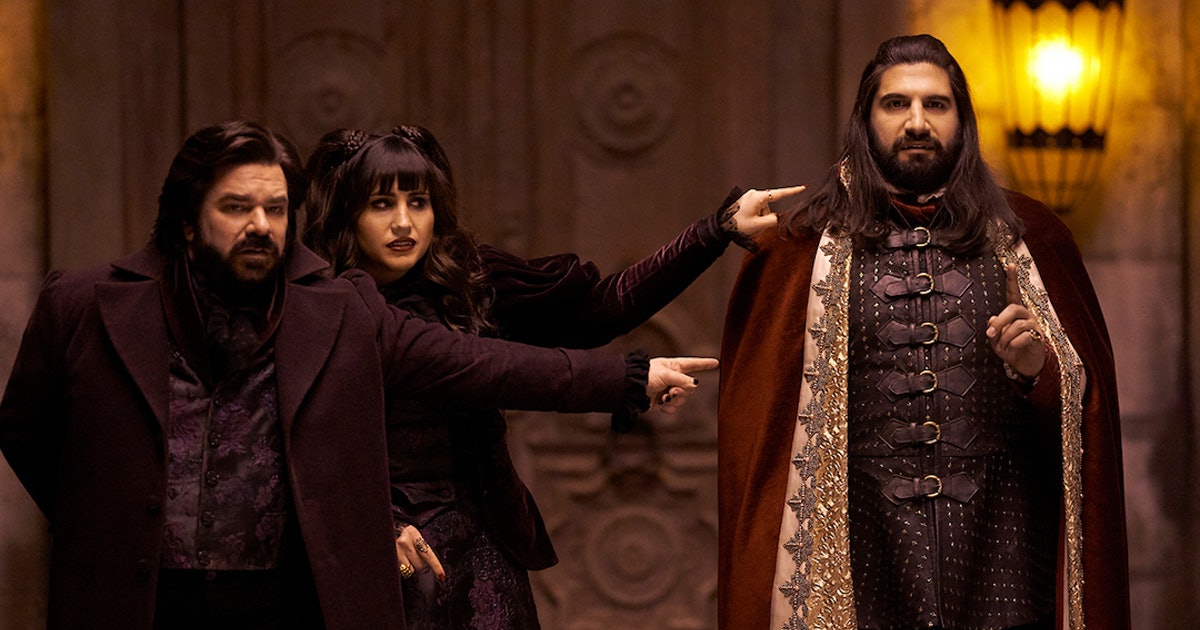
What We Do in the Shadows
The show’s second season is as brilliantly inspired and riotously funny as its first, continuing to conjure up ridiculous, often gut-splitting interactions between its cast of immortal European vampires and the sleepy Staten Island neighborhood where they live. The benefit of serialized television is the additional time each new season brings, providing the writers with more opportunities to lavish flavor and pathos on their characters, from bite-sized cameos to episode-length one-offs. What We Do in The Shadows fully takes advantage of this phenomenon, with a roster of spooky weirdos who only get funnier and more charming the more time we spend with them. Whether it’s Lazlo forever shouting “bat!” before transforming into one, Nandor grimacing in a perpetual state of confusion, Nadja swinging effortlessly between unhinged and saccharine, Colin Robinson glancing conspiratorially at the camera, or Guillermo bumbling his way into accidental heroics, each character is given their moment and their space to grow and become more robust, memorable and unique figures. The show is no longer, nor ever really was, a mere adaptation of the film, and with its second season shows what a talented cast of performers paired with a knockout writers room can accomplish given the time.
– Yussef Cole




